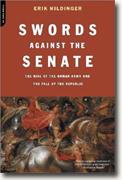Erik Hildinger
book reviews:
· general fiction
· chick lit/romance
· sci-fi/fantasy
· graphic novels
· nonfiction
· audio books
· author interviews
· children's books @
curledupkids.com
· DVD reviews @
curledupdvd.com
newsletter
win books
buy online
links
home
for authors
& publishers
for reviewers

 |
Swords Against the Senate: The Rise of the Roman Army and the Fall of the Republic Erik Hildinger DaCapo Press Paperback 256 pages November 2003 |
|
I picked up both Rubicon and Swords Against the Senate at the same time, for some reason thinking that Swords was about the fall of Roman Empire itself. Little did I know that I was reading two books on basically the same subject at the same time. However, this did give me a great insight into the time period and allowed me to do a good comparison of the information. I'm glad it worked out this way.
In his introduction, Hildinger remarks that his book will cover three aspects of Roman life: the army, the personalities, and the "gradual chipping away of the constitution" that led to the republic's demise. He expertly interweaves these branches of the story into a wonderful narrative that's interesting to read and hard to put down. At times, this does feel a bit disjointed, as he will introduce the characters involved and then go on a brief diversion to explain how the army was set up at that time. Once he gets back to the narrative, though, it's obvious why he diverted down that path as the knowledge is valuable to understanding what is happening. While this may sound boring, it really isn't. He rarely spends more than a couple of pages on the specifics of the army make-up before moving on. Hildinger uses a variety of primary and secondary sources, along with some more modern interpretive sources (something Holland didn't really do) to back up his narrative. He also is not afraid to say when the sources are unclear on a subject, especially where casualty figures are concerned. He often states the given casualty figures and then reminds us that these figures were often exaggerated. If something was taken from Sulla's memoirs (for example), he'll remind the reader that this could very well have been included to make Sulla look good. He'll make informed suppositions about certain things, but he's always clear when something might not be true: "Sulla took no direct hand in following up the killing, and apparently no one was punished." pg 184 (emphasis added)I found that this added to the attraction of the book, giving me a feeling of piecing together history along with Hildinger. The book concentrates heavily on the army and on military elements. Hildinger details the various wars (both external and civil) that took place in this thirty-year period, how various Roman generals and consuls took their troops and marched them on Rome, or formed their own private armies and went campaigning in Asia. We get descriptions of the battles, some of the tactics (at least as much as is known), and the fight for who would get credit for victories. We also get the politics behind the various wars, along with the personality conflicts that would ultimately sunder the republic, especially those between Marius and Sulla. Ultimately, Sulla would win out and become the appointed dictator while he got the constitution back in order. The book ends with Sulla's victory, and the epilogue talks of how Sulla created a new constitution and then retired after three years as dictator, allowing the Roman Republic to reassume power, though the fissures were already in place to bring it toppling down again. This makes a good stopping point for Hildinger, as this book is really about how the army was involved in this conflict, and how the personalities used it. Once Sulla retires, it becomes much more of a personal battle between strong-willed men. For those who wish a general overview of how the Roman Republic fell, Swords Against the Senate isn't really a good place to start. It doesn't cover the whole thing and it's a little too detailed for that. It may, however, spark your interest so that you do want to go on to an overall account after you have read it. It also is a valuable source for military matters in this time period. In whatever order you decide to read it, you owe it to yourself to pick up a copy. © 2004 by David Roy for Curled Up With a Good Book |
|
|
|
 Click here to learn more about this month's sponsor! |
|
| fiction · sf/f · comic books · nonfiction · audio newsletter · free book contest · buy books online review index · links · · authors & publishers reviewers |
|
| site by ELBO Computing Resources, Inc. | |
 Swords Against the Senate by Erik Hildinger doesn't cover quite the same ground as Tom Holland's
Swords Against the Senate by Erik Hildinger doesn't cover quite the same ground as Tom Holland's